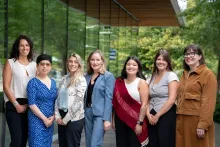
Chronic shortages of doctors and nurses. Long waitlists for specialty rehabilitation care like speech-language pathologists and occupational and physical therapists. Higher rates of complex mental health disorders, obesity, traumatic injuries, and self-reported disability. That’s the healthcare picture in remote and rural areas of British Columbia. And it’s what a new project coordinated by UBC Health aims to address.
The Rural Education Access Coordination Hub (REACH) will bring together health practitioners, providers, and educational institutions to facilitate more quality work-learn opportunities for students in the healthcare professions as well as more support for the professionals who mentor them. “Access to healthcare professionals is disproportionately lower for people living outside urban centres, and this contributes to inequity and poor health,” says Anne Martin-Matthews, Associate Vice-President, Health at UBC. “We know that by placing health profession students in rewarding work-learn practice settings in rural and remote areas, they tend to stay after graduation.”
UBC is the largest educator of student health professionals in the province and the only educator of BC’s student pharmacists, dieticians, speech-language pathologists, and occupational and physical therapists. UBC Health promotes collaboration and integration in research and education across the university’s world-renowned health programs spanning faculties, schools, and the province.
There are other challenges facing the delivery of quality healthcare services in rural BC, says Carrie Krekoski, Practice Education Manager at UBC Health. “In addition to historic shortages of healthcare providers, there is a rapidly growing, aging, and diversifying population. Combined with an insufficient number of new graduates to meet increasing health workforce demands, this creates a very serious situation,” she explains.
UBC students in health professional programs are required to spend about 40 percent of their training in clinical and community placements. While there are growing numbers of students in these programs, there isn’t a proportional increase of students in rural and remote placements. “It’s critical that we adequately support the healthcare professionals who supervise our students, so we can create and fill more rewarding learning opportunities in rural and remote areas of the province,” says Carrie.
To tackle this challenge, Carrie says that REACH will take a coordinated, interdisciplinary approach that focuses on shared supervision models, peer mentorship, and the innovative use of telecommunications in the age of a pandemic. “Through REACH, UBC and other post-secondary institutions can create a pipeline of well-trained health professionals to underserved areas of BC.” The Nechako-Bulkley region, centrally located between Prince George and Prince Rupert, will be used to develop and pilot the REACH framework.
REACH is supported by $116,000 in funding from the Ministry of Advanced Education, Skills and Training Co-op and Work-Integrated Learning Initiative. Partners include UBC Health, UNBC Nursing, Northern Health, College of New Caledonia, and health professional programs at UBC Vancouver (Pharmacy, Dietetics, Medicine, Physiotherapy, Occupational Therapy, and Speech-Language Pathology) as well as UBC’s Chair of Rural Health and Centre for Rural Health Research and the Rural Coordination Centre of BC.
UBC Health works under the auspices of the Office of the Vice-President Health to enhance interdisciplinary health education, research, and systems by fostering collaboration across disciplines and faculties at both UBC campuses, as well as with institutions and government organizations around the province.



